- Home
- Joseph Bruchac
Bearwalker Page 5
Bearwalker Read online
Page 5
Kahionhes took us out behind his father’s house and pointed out the big rock where the bears came to eat. So much fat had soaked into it over the years that it shone in the sun like it was made of glass. But we stayed way back from it because it was the bears’ place and not ours. And we didn’t see any bears that day.
Mom and Dad promised me they would take me back to the Six Nations Indian Museum again. But that autumn my dad was sent to Afghanistan and never came back. And then the summer after that Mom did her first tour in Iraq. So most of what I have learned about bears since then has been from books and TV shows on the Animal Planet channel.
“You can learn a lot from books,” my dad said to me. “Just remember that books are like people.”
Dad was always saying things like that. He didn’t elaborate about what he meant, but I think I understand. Just like people, books don’t have all the answers. They can be right or wrong, honest or dishonest. But you can always learn something from both people and books—even those that try to deceive you, as long as you figure out that is what they’re trying to do.
One of the things I learned from books that I believe to be true is that in the right way of things, the bears walk their way and we humans walk ours. When someone joins the bears, it is only because things are not right with the world. Like in that story I mentioned to Mr. Mack. When a child is lost, the bears may take that child in for a while. But the right way for the story to end is for the child to go back to being a human, carrying with them what they’ve learned from their stay among the bears. But if someone who is a grown-up strays into the territory of the bears, then the results will not be good. Death may be what follows.
Bearwalkers. That is what the Ojibway people who live near the Great Lakes call those who choose to put on the skin of the bear, to gain power in that way—and be corrupted by that power in turn. When you become both a human and a bear, your double heart no longer sees the light as either humans or bears do. It was from a book that I learned that to become a bearwalker you have to sacrifice one of your own family. Blood for power. And then power calling for more blood.
All of that has gone through my mind as Mr. Mack keeps talking. Then he turns his gaze toward the back of the crowd and makes a wide gesture with his hand. Sort of like a ringmaster about to bring in the lion tamer.
“Now let me introduce a very important member of our staff. He’s been off setting up the primitive camping area so you have not met him yet. He’s new to us this year, but he brings a very special kind of knowledge our way. He’s our wilderness expert. The one who will be taking you into the woods and”—Mr. Mack chuckles as he makes what he thinks is a sly little joke—“bringing most of you back again. Our own Native American tracker, Walker White Bear.”
Everyone else applauds. I don’t. I don’t even want to look back, but I do. And there, stepping out of the woods behind us, is the one I knew I’d see. The grisly necklace that he wears looks as if each bear claw is tipped with blood.
8
Bad Vibe
I lean my head back against the rough bark that still clings to the log siding on the wall of the boys’ cabin. I’ve been assigned to fire-tending detail, but I’ve slipped away from it. It’s only an hour until dark, and it’s the kind of darkness that comes earlier, more suddenly, more completely here in the forest. There’s no gradual fading into twilight like there is in the lake-plain lands. Just one second it’s day and then the next second it’s deep night.
I should be bringing more wood to make sure there is enough for the fire to keep burning all night. There’s electricity in the cabins, but when nine o’clock comes it is supposed to be lights out. Total darkness inside. And aside from the lights that are kept on in the two latrines and in front of the main building—lights that I know will look pitifully small—the only illumination outside will be from the campfire. There’s a full moon tonight but it was increasingly cloudy this afternoon, so even those ancient beings of light that show their faces through the blanket of night probably won’t be looking down on us.
But I’m not getting wood. For one reason, the person who is in charge of the fire scares me even more now that I’ve actually heard what he had to say. Hair stands up on the back of my neck when I remember the sound of his voice. It spooked me even more when I looked around and saw that his voice was clearly not having that effect on everyone else. To them it sounded the way he wanted it to sound. Deep, reassuring, helpful, informative.
“Pay attention now, young people,” he rumbled. “Watch how I’m holding this knife while I make this fire stick. There’s a right way and a wrong way. Right way—cut away. Wrong tack-draw it back. You never want to cut toward yourself unless you are fixing to slice the skin off your finger for a little snack. Hunh-hunh!”
And everyone laughed with him at that joke about cutting his own flesh. Well, almost everyone. They even laughed when he pretended to do just that—slice a piece of flesh off his finger.
I was waiting now to try to talk with the one person who had looked skeptical as Walker White Bear gave his little demonstration about fire-making. That person was engaged in a serious discussion around the corner from where I was standing. My aim was not to eavesdrop, but sometimes you just can’t help hitting what you aren’t aiming for.
“You might be overreacting, Kirk,” Mrs. Smiler says. “You only met the dude two hours ago.”
“Listen, Ginny,” Mr. Wilbur says. I can picture him stroking his chin with his fingers as he says it. “There is something wrong here.”
“A bad vibe?” Mrs. Smiler replies. I can tell by her tone that she is being sarcastic. When she is teasing someone she likes to resort to sixties lingo, even though she grew up in the nineties. She’ll say things like “You’re tripping me out, man” when a kid complains that PE class is too hard or “Right on” when someone manages to do something like a forward roll correctly.
“This isn’t a joke,” Mr. Wilbur says. I’m not used to hearing him sound so serious. “And yes, I am getting a bad vibe about this whole trip. Why would they hire someone like him? After the first five minutes of his lecture you could see he didn’t know squat about fire-making. And it’s not just…him. I didn’t know the entire staff of the camp had changed. The only people who were here before are the cook and the caretaker.”
“So you don’t like Mr. Mack, either?”
“Now that you mention it, no. I’d like to see his résumé. Does he act or talk like someone who’s used to working with adolescents? And did you see the way he treats the Osgoods? They’ve been here for over twenty years and he acts like they’re just peons. And what was up with him just reading from a magazine and pretending it was a lecture about bears? And all that talk about what kind of injuries bears can inflict on a person? It was like he was trying to either bore them or frighten them to death. There’s something fishy going on.”
“Then why haven’t there been any complaints from other school groups coming here?” Mrs. Smiler asks. She’s not joking now. Mr. Wilbur’s words seem to be getting through to her.
“Listen,” Mr. Wilbur says. “We’re the first group to come through this fall. Don’t you remember? Camp Chuckamuck was closed for the last two months of the summer. But did you know that it wasn’t even certain it would ever open again?”
Of course I’ve been listening, but now I pay more attention as Mr. Wilbur explains how Mr. and Mrs. Philo, whose family founded the camp two generations ago, just decided this past year they were too old to run it any longer. He’d had a heart attack and she had bad arthritis. They’d immediately been offered a huge amount of money for their fifteen hundred acres by developers. People were interested in buying luxury condos in the wilderness and because the camp was not inside the boundaries of the Adirondack Park, development was not restricted by the Adirondack Park Agency. Chuckamuck was less than an hour’s drive from the Adirondack Northway, a four-lane highway that led to Montreal in one direction and New York City in the other. Chuckamuck was also l
ess than a half-hour away from some of the prime skiing areas in New York. The state of New York had also been trying to obtain the land to add it to the forest preserve. It was only a short time ago that the decision had been made not to sell—at least for now. The Philos were less interested in money than in preserving their beloved camp for young people. They had no living children of their own—their own kids had died in an accident. Their only heirs were two nephews. So the plan now was to not sell it to either the state or the developers. Instead, they were putting the whole camp into a conservation easement to make it possible for more generations of kids to come here.
That was what Mr. Wilbur explained. And that he knew all this background information because the Philos, the people who own the camp, are longtime friends of his own parents.
Mrs. Smiler has been listening without making a peep through that whole long explanation. But from the sound of her voice when she finally does speak up, she seems unimpressed.
“So it’s a win–win situation for the kids and the founders of the camp. Groovy. What’s the hassle?”
I hear Mr. Wilbur sigh, then take a deep breath. “Listen,” he says. “The papers haven’t been signed yet. What if this whole camping season is a disaster? What if they decide not to put it into an easement and it ends up being sold to developers? You know who would benefit financially? Those nephews. And I’d be willing to bet they’re the ones who hired this rinky-dink staff.”
“Kirk,” Mrs. Smiler replies, “I still think you’re being paranoid. Get real.”
I wait until the sound of her feet walking away on the gravel is gone. Then I go around the corner to where Mr. Wilbur is still standing.
“Baron,” he says, dropping his hand from his chin and trying to lose the worried look on his face. “What’s up?”
More than you know, I think. More than you know.
9
Unexpected Arrivals
I’m not exactly sure what I am going to say to Mr. Wilbur. I’m not one of those people who makes up speeches in his head, trying to get every word just right before speaking up. But when I do get started, I usually say exactly what is on my mind. This is another reason why my mouth has gotten me into trouble in the past.
But I don’t get a chance.
A horn honks from behind me and I almost jump out of my skin. Even though a part of my brain has been registering the sound of wheels rumbling along the dirt road, I’ve been so intent on talking to Mr. Wilbur that I’ve ignored it.
There’s a big smile on Mr. Wilbur’s face as he looks over my shoulder.
“Wally and Dora,” he says. “I can’t believe it! I never expected them to be here.”
An old blue Ford Bronco in mint condition is pulling up. There’s a handicapped parking sticker in the window. An elderly woman with a huge halo of white hair is the driver. She waves one hand at us as she climbs out, then slowly begins to make her way around to the other side, where an equally elderly man in the passenger seat is waiting for her to open the door.
“Come with me, Baron. I want you to meet just the people I need to talk to right now.”
We trot over to the car in time for me to get the door and for Mr. Wilbur to offer his left arm to the tall, thin old man who is now slowly climbing out as well as hug the elderly woman with his right.
“Kirk,” the elderly man is saying, “I’m not an invalid. I can get out by myself.” But I notice that he doesn’t push Mr. Wilbur away as he says this and that he leans his weight onto my teacher as he brings one foot and then another down onto the ground with the careful deliberation of a heron wading into uncertain waters. I reach out my hand to help him balance and he takes it. His hand is dry and cool and his long fingers wrap around my wrist. It doesn’t bother me at all. I’m used to helping old people like that. I do it all the time with Grama Kateri on the days when her “rumatiz” is acting up.
“Thank you, boy,” the cloud-haired old woman says, patting me on the back. “So nice to see a young man with manners.” Then she pokes a finger at the chest of the old man. “Not an invalid, you say? Hah. Let’s you and me run a hundred-yard dash and see who wins now, Wally Philo.”
She turns to look down at me.
“Boy,” she says, “Wally’s walker is in the backseat. Be a dear now and get it before this old fool falls down on his face and we have to use a derrick to get him back up again.”
As I go to the back door, Mr. Philo raises his hand in a gesture like that of a priest about to give a benediction. “Fall down? Hah. With this new wiring in my chest, by this time next week I’ll be dunking a basketball again.”
“In your dreams, darling,” Mrs. Philo replies.
“If I could interrupt for a moment,” Mr. Wilbur says, “let me introduce one of my students to you. Baron Braun, these two superannuated cutups are the founders of this camp, Wallace and Dora Philo.”
Mrs. Philo reaches over to grasp my hand. “Braun? We knew a Braun family, didn’t we, Wally? You a Mohawk, boy?”
“Yes, ma’am,” I say.
“Seh’kon,” Mr. Philo says, leaning over to take my other hand with those long fingers of his.
“Seh’kon,” his wife repeats.
I’m stunned. They’ve just greeted me in flawlessly pronounced Mohawk.
Mr. Philo is the one who explains. “I was a fairly successful professional basketball player. Way long ago.”
“Before the invention of the wheel,” Mrs. Philo interjects.
“Along the way, I learned how popular basketball is among Indians. So I used to do a workshop every now and then in reservation schools. That’s where I picked up a bit of Mohawk. I remember back about twenty years ago there was a tall young man by the name of Braun who had some promise as a guard at the Akwesasne school.”
“That would be my dad,” I answer. I wait for them to ask the question I don’t want to hear. Where is he now? But they don’t ask. The Philos just look at each other and nod.
The four of us stand there in silence. It isn’t awkward, more like the kind of silence I’m used to experiencing around Indian elders, a silence that gives folks a chance to just settle in with each other. Mr. Wilbur is the one who finally breaks it.
“I have to say I’m really glad to see you both. This is perfect timing. But what brought you here?”
For the first time, the Philos look surprised.
“Are you joking, dear?” Mrs. Philo says. “You’re the one who left us the urgent message saying that we had to be here at Chuckamuck today.”
Mr. Wilbur puts his hand to his chin. “Listen,” he said, “I didn’t send you any message at all. I wonder what—”
He doesn’t finish that sentence. The sound of an explosion cuts him off.
10
Stuck
The road is totally blocked. Unless we want to walk, we’re stuck at Camp Chuckamuck. We’re gathered after dinner around the big fireplace in the main building. Almost all of us are here except Mr. Osgood. Just about everyone is acting like all of this is no big deal.
But I don’t think so. This is a big deal. That explosion didn’t just block the road, it also took out the phone lines, which ran between the hills that collapsed when the dynamite went off. The only reason we still have electricity is because the power company strung their lines over the hill rather than through that gap.
Poe-boy bumps his wide flat head against my arm. He looks up at me with his big, sympathetic Labrador eyes. It’s like he’s trying to tell me something. I reach out and rub his head and neck and his tail thumps on the floor in response. Before he left, Mr. Osgood told him to stay, even though he whimpered and struggled so much to follow him at first that he had to be shut in the kitchen. It was like he knew it wasn’t safe for his master to go off like that on his own. It was only after Mr. Osgood had been gone for half an hour and he stopped scratching at the door that Mrs. Osgood finally let him out.
The explosion had surprised just about everyone, except the Philos, who knew what it was right away.
“That was your dynamite, dear,” Mrs. Philo had said in an admonitory voice to her husband while the blast was still echoing over the lake and people were running around like chickens with their heads cut off.
Mr. Philo’s dynamite, as his wife kept calling it, was indeed what caused the explosion. That shack with the KEEP OUT and STAY AWAY warnings painted on its side had been built by a professional contractor to store the explosives that were supposed to have been used to widen that narrow gap between the rocky hills. Mr. Philo’s heart attack a year ago had stopped that construction project, though. What surprised the Philos was that the dynamite was still there. It was supposed to have been removed because dynamite can become unstable if it isn’t stored properly.
“We’ll be having a word with that contractor,” Mr. Philo said to the crowd of campers gathered in the main building, who had become an appreciative audience for him and his wife.
“More likely a number of words we won’t repeat in polite company,” Mrs. Philo added. Just about everyone laughed.
I didn’t. I was worrying about too many things. The dynamite shed was so close to that gap in the hills that when it blew, it brought down tons and tons of stone as well as the trees that were growing higher up. Halfway through the gap the road just ended in a twenty-foot-tall wall of stone and earth, topped with toppled cedars. On either side of those hills the land rose into mountains. There was a walking trail that swung around the now closed gap and rejoined the road. But even an off-trail vehicle wouldn’t be able to negotiate that. The only way around the landslide was on foot.

 Peacemaker
Peacemaker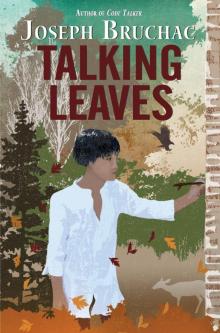 Talking Leaves
Talking Leaves Found
Found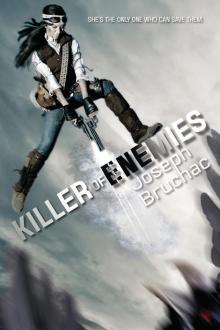 Killer of Enemies
Killer of Enemies Wabi
Wabi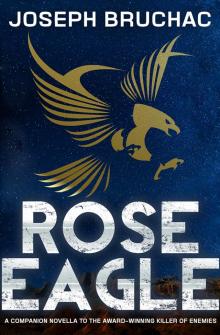 Rose Eagle
Rose Eagle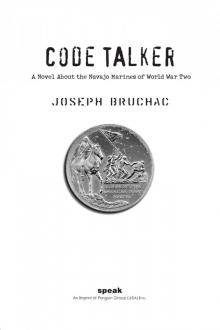 Code Talker
Code Talker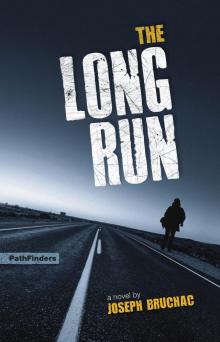 The Long Run
The Long Run Dragon Castle
Dragon Castle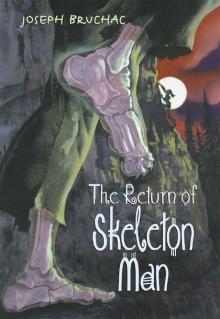 The Return of Skeleton Man
The Return of Skeleton Man Pocahontas
Pocahontas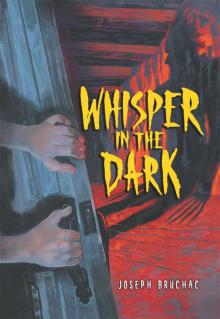 Whisper in the Dark
Whisper in the Dark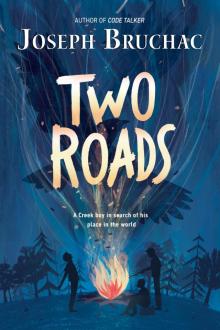 Two Roads
Two Roads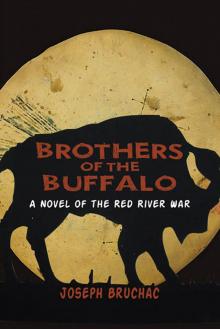 Brothers of the Buffalo
Brothers of the Buffalo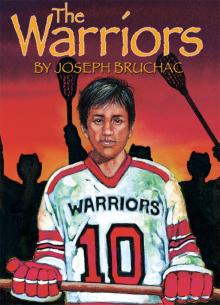 The Warriors
The Warriors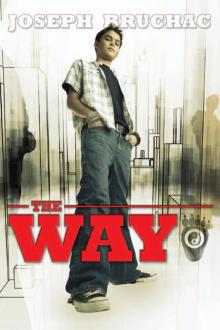 The Way
The Way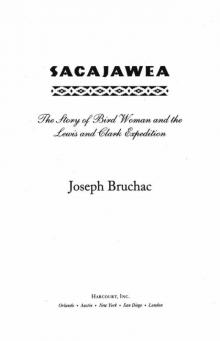 Sacajawea
Sacajawea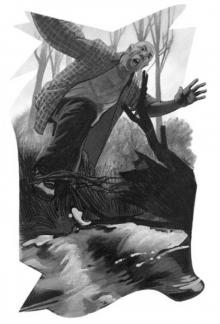 Night Wings
Night Wings March Toward the Thunder
March Toward the Thunder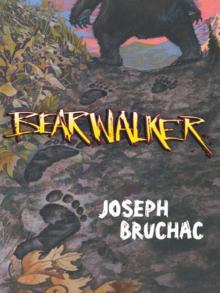 Bearwalker
Bearwalker Skeleton Man
Skeleton Man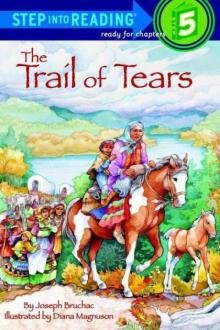 The Trail of Tears
The Trail of Tears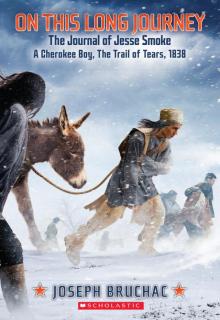 On This Long Journey
On This Long Journey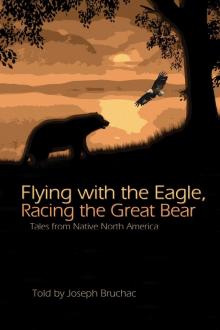 Flying with the Eagle, Racing the Great Bear
Flying with the Eagle, Racing the Great Bear